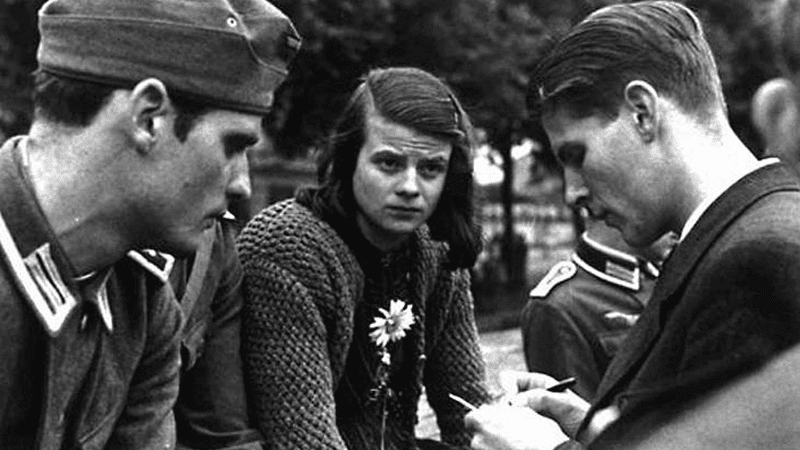Who was the White Rose?
The White Rose was a non-violent, intellectual resistance group in Nazi Germany, led by a group of students and a professor from the University of Munich.
The two siblings Hans and Sophie Scholl were members of the White Rose movement. Sophie, a gifted and spirited young woman, was known for her passion for philosophy and literature, while Hans, a dedicated medical student, possessed a strong sense of justice and a deep commitment to opposing the Nazi regime.
This courageous group actively opposed the policies of the Nazi regime, including the atrocities committed against Jews and others. Their efforts to distribute leaflets urging non-violent resistance and dissent against the regime ultimately led to their arrest and execution. The White Rose remains a symbol of bravery and moral courage in the face of tyranny, inspiring people around the world to stand up against injustice.

The White Rose distributed a total of 6 leaflets between 1942 and 1943.
Sophie and Hans Scholl distributed the sixth White Rose leaflet in the atrium of Munich University on 18 February 1943. They were discovered and immediately taken prisoner.
Excerpts from the White Rose leaflets
Isn’t it true that every honest German is ashamed of his government these days? Who among us has any conception of the dimensions of shame that will befall us and our children when one day the veil has fallen from our eyes and the most horrible of crimes – crimes that infinitely outdistance every human measure – reach the light of day?
part of the 1st leaflet of the White Rose
Why do you allow these men who are in power to rob you step by step, openly and in secret, of one domain of your rights after another, until one day nothing, nothing at all will be left but a mechanised state system presided over by criminals and drunks? Is your spirit already so crushed by abuse that you forget it is your right – or rather, your moral duty – to eliminate this system?
part of the 3rd leaflet of the White Rose
What can we learn from the White Rose movement?
1. Courage in the Face of Tyranny: The members of the White Rose, including Hans and Sophie Scholl, demonstrated extraordinary courage in speaking out against the Nazi regime despite the grave risks involved. Their unwavering commitment to justice serves as a powerful example of moral courage in the face of oppression.
2. The Power of Nonviolent Resistance: The White Rose advocated nonviolent resistance as a means of opposing the Nazi regime. Their actions underscore the enduring impact of peaceful activism and civil disobedience in the pursuit of justice and human rights.
3. The Importance of Speaking Out: The White Rose members recognized the significance of raising their voices against injustice. Their efforts highlight the crucial role of individuals in speaking out against tyranny and standing up for what is right, even in the most challenging circumstances.
4. Inspiring Future Generations: The legacy of the White Rose movement continues to inspire people around the world to stand up against oppression and to champion the values of freedom, human dignity, and social justice. Their story serves as a reminder of the enduring impact of principled resistance and the importance of upholding moral values in the face of adversity.
5. International Solidarity and Support: The international attention and support received by the White Rose movement, including the reprints and distribution of their leaflets by Allied forces, highlight the significance of international solidarity in supporting movements for justice and human rights.
Es lebe die Freiheit! (Let Freedom live!)
- Hans Scholl’s last words before his execution.




Leave a Reply